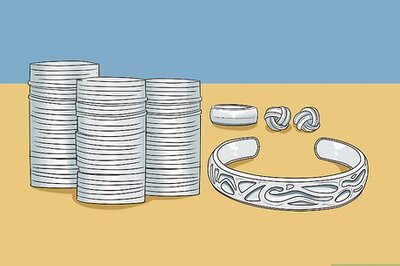
views
Apple Inc. (AAPL.O) appealed against a $14-billion tax demand as the European Union issued details of its ruling that the iPhone maker won sweetheart tax deals from the Irish government which amounted to illegal subsidies.Read more: Apple Brings Panic Button to iPhones With iOS 10.2 UpdateThe tech giant's combative stand -- its lead lawyer told Reuters that Apple was a "convenient target" for an EU antitrust chief driven by "headlines" -- underlined its anger with the European Commission, which it says ignored evidence from Irish experts before the decision on Aug. 30.
The Obama administration also voiced displeasure at what it said was the European Union helping itself to cash that should have ended up in the United States while many in Silicon Valley saw it as further proof that an envious Europe, having lost out on new tech markets, is trying to rig regulations against them.Also read: Apple Releases 'Best of 2016' List for India
Competition Commissioner Margrethe Vestager has rejected those claims and on Monday, while making no new comment on a case which is also being appealed by the Dublin government, the EU executive published an edited text of her judgment.
Apple's Irish tax arrangements have allowed it to pay tax at a rate of 3.8 percent on $200 billion of overseas profits over the past 10 years, according to a Reuters analysis of corporate filings.
This is a fraction of the tax rate in the countries where Apple’s products are designed, made and sold. The low rate is achieved by Apple telling U.S. authorities that the profits are earned by Irish units. Meanwhile, Apple and Ireland agree the profits are generated in the United States.
Among elements revealed by the Commission's edited text was a record of a meeting between an Apple tax adviser and the Irish revenue service in 1990 in which they discussed setting an apparently arbitrary ceiling on the profit on which Apple's Irish unit would be taxed locally.
A year after Apple's Irish branch had recorded a net profit of $270 million, its tax adviser proposed that no more than $30-40 million a year be taxed in Ireland, since the rest was attributable to technology and marketing businesses elsewhere.Read more: Apple AirPods on Their Way to Customers
"[Apple’s tax adviser] confessed there was no scientific basis for the figure. However the figure was of such magnitude that he hoped it would be seen to be a bona-fide proposal," the excerpt cited in the Commission judgment read.
The reference is part of the Commission's case that Ireland gave Apple special treatment to induce it to base its European operations in the country and channel profits through Ireland.
While independent tax experts scanned the documentation for more clues to Vestager's overall approach, another element that stood out was its concern about the way Dublin did not set time limits on its rulings on how Apple's income would be taxed. That could signal trouble for other multinationals facing Brussels' ire, not just in Ireland but in several other EU countries.U.S. TAX REFORM
Apple lodged its appeal at the EU's General Court, setting up a legal battle that has strained Transatlantic relations and could remain a factor after celebrity businessman Donald Trump succeeds Obama in the White House next month.
The U.S. Treasury Department said in a statement it continued to believe that "the Commission is retroactively applying a sweeping new state aid theory that is contrary to well-established legal principles, calls into question the tax rules of individual countries, and threatens to undermine the overall business climate in Europe. Moreover, it threatens to erode America's corporate tax base."
The Irish government, which faces anger at home among opposition politicians that it is trying to turn down a huge tax windfall, separately published its legal arguments against the Commission's case on Monday, saying Brussels had exceeded its powers and stepped on EU states' sovereignty.
Lawyers have previously said it was impossible to predict how EU courts will rule in an area that has not been tested before.
Ireland’s tax treatments, now amended, have allowed Apple to avoid tax on tens of billions of dollars of non-U.S. profit.
The Commission says the Irish units conducted key functions for developing the Apple brand and that Dublin underestimated their importance when determining their taxable profit.
Apple says all the research and development takes place in the United States, which is also where key decisions about its products are made, meaning taxes should be paid there. Under U.S. tax law, however, companies pay tax on global profits but only when they are repatriated to the United States.
The incoming Trump administration could change this.




















Comments
0 comment